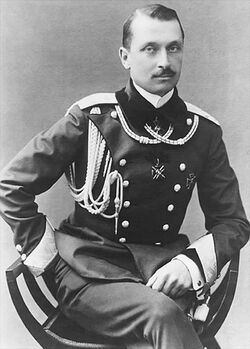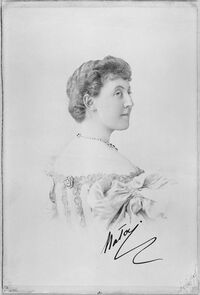| Kustaa I | |
|---|---|
| King of All Finns, Duke of Karelia, Liberator of Ingria
| |

| |
| Gustaf Mannerheim during 1918 | |
| Reign | 11 November 1918 |
| Coronation | 6 Dec 1919 |
| Predecessor | Position Created |
| Born | 4 June 1867 Askainen, Grand Duchy of Finland, Russian Empire |
| Consort | Kitti Linder (m. 7 June 1920) |
| Issue | Princess Liisa King Kaarle I Prince Albert |
| Full name | |
| Carl Gustaf Emil Mannerheim | |
| House | Mannerheim |
| Father | Count Carl Robert Mannerheim |
| Mother | Hedvig Charlotta Hélène von Julin |
| Religion | Unknown, officially Evangelical Lutheran Church of Finland |
| Occupation | Military officer, statesman |
| Signature | |
Kustaa I (Carl Gustaf Emil; 4 June 1867 -) was King of Finland from his coronation 11 November 1918 until his death. He was the first King of Finland after a failed election of German Prince Frederick Charles of Hesse. Before his ascension as King, Kustaa served as the military leader of the White Finnish Army during the War of Liberty and was shortly the Regent of Finland before the end of the war which is recognised as his official accession.
Kustaa first made a career within the Imperial Russian Army becoming a lieutenant general. Not only this, but he attended numerous ceremonies for Tsar Nicholas II such as his coronation and later had several private meetings with the Tsar. After the summer of 1917, Kustaa fell out of favor with the new government due to his political differences with the revolution and so was relieved of his duties leading to his retirement and returned to Finland.
The declaration of Finnish independence led to civil war concluding with expansionism into ex-Imperial Russian territory (that was now occupied by the Soviet Russian Federation) and the independence of Estonia. Kustaa is widely recognized as the "Forefather of Independent Finland" due to his Military prowess and political presence as both a negotiator and a ruler. His reign was problematic and difficult initially, attributed to anti-monarchists and ultra-national-republicans internally and its neighbour the Russian Soviet Federative Socialist Republic.
He is sometimes referred to as Toinen Väinämöinen (Second Väinämöinen) due to his part in the Independence of Finland and the comparison to Väinämöinen's contribution to the creation of Earth and his respective travels.
Early life and Military Career[]
Ancestry[]
The House of Mannerheim descends from a German businessman known as Heinrich Marhein (1618-1667). He emigrated to the Swedish Empire which lead to his son, Augustin Mannerheim, to change the family surname to Mannerheim. King Charles XI raised the House to nobility in 1693. Augustin's son, Johan Augustin was raised to Barony status in 1768. The late 18th century lead the family to move to Finland which at the time was still part of the Swedish Empire.
Kustaa's great-grandfather, Count (elevated 1825) Carl Erik Mannerheim (1759-1837) served as the first Prime Minister of Finland. His son, Kustaa's grandfather, Count Carl Gustaf Mannerheim (1797-1854) was an entomologist who was later the President of the Viipuri Count of Appeals. His son, Kustaa's father, Carl Robert (1835-1914) was a radical, liberal playwright who also had relative success as a industrialist. Kustaa's mother was the daughter of a wealthy industrialist.
Initially, Kustaa inherited the title of Baron being the third child of the family. Kustaa's father went bankrupt in 1880 leading to him selling the family estate to his sister, including a large art collection. He swiftly left the family, moving to Paris with his mistress. By 1887 he had returned to Helsinki and founded the Systema Company serving as the manager until his death. Kustaa's mother, Hélène was shaken by the ordeal, from bankruptcy to the breakdown in marriage, and took the seven children to live with her aunt at her estate in Sällvik. She never fully recovered from the situation and died a year later of a heart attack leaving Kustaa's uncle, Albert von Julin, as his legal guardian.
Imperial Russian Army[]
Kustaa's first service in the Army was a voluntary role in the Russo-Japanese war in 1904. Initially he was a Lieutenant-Colonel but was promoted after Battle in 1905 to Colonel. After the war he was sent to China as a secret intelligence officer with regards to the Qing dynasties reform and modernisation. This was vital information in order for Russia to plan an invasion of Western China. It wasn't until 1908 he finally arrived in Beijing after a long expedition around Eurasia and Western China. He began his intelligence work and returned to Russia in 1909. Upon return he was sent to command a light cavalry unit in Poland. A year later, he was promoted to major general. On the outbreak of the Great War, Kustaa fought on the Austrian-Hungarian and Romanian fronts, earning the highest military distinguished award, the Order of St. George, 4th Class.
War of Liberty[]
In January 1918, the senate of newly self-declared independent Finland, under Pehr Evind Svinhufvud, appointed Kustaa as Commander-in-Chief of White Finland's Army which consisted mainly of organised local militia known as the White Guard. His objective was to defend the government and its forces against Red Finland, another self-declared independent movement in southern Finland inspired by the October Revolution that occured in Imperial Russia. Kustaa's operations were initially established in Vaasa, where he based his headquarters, far from the southern forces. Russian garrisons were across all of Finland due to its autonomous status under the empire and Kustaa disarmed them and the 42,500 men stationed in them.
The brief but bloody civil war was a success for the Whites and the majority of fighting had ended by early May thanks to German assistance. Kustaa remained adamant that to assure Finnish independence, consolidation of their borders should be established through assistance to the White movement in Russia. There was general opposition to this due to German interventionism at the time and so Kustaa resigned as Commander-in-Chief.
Liberty Speech[]
Upon return to Helsinki, Mannerheim gave a speech in front of a substantial crowd in the Helsinki Senate Square following a march through the city with the White Guard.
- "Our land was naked to robbery and plunder. We had been compelled to watch helplessly as we were murdered. The Finnish Ship of State is now entrusted to our hands, beyond the reach of party wrangling. We have no need to make compromise or bargain over the power of government for trifle. In the ranks of the White Army stands every loyal man in belief that in the era which is beginning, his hopes will not be disappointed. I will not let that happen. The thousands of white spirits in cemeteries through the distant Finnish countryside can sleep soundly knowing their sacrifice has not been in vain. We can finally inhale knowing that Finland will pursue an avenue of unified celebration and prosperity. We have only just began laying the foundations our nation will stand on but it is to be believed our continued cooperation will only result in success."
Reign[]
Regency[]
Initially, Mannerheim was made Regent of Finland and de facto head-of-state in December 1918 through democratic vote. He was to act as the official representative to the Allies in the West due in part to his international fame following his successful campaign in the Finnish Civil War and familiarity with some European royalty (particularly in Scandinavia).
Upon his return to Finland, Mannerheim put a halt to the republican-backed constitutional draft. In February 1919, Mannerheim was secretly making plans for the intervention in the Russian civil war. He had concluded with his closest generals that their involvement in the civil war was time critical and once more Mannerheim recognised the delay that would be caused by government. On February 13th he, with 400 White Guard loyalists, stormed the Senate Building. He declared Parliament closed and enacted the new Finnish Constitution without opposition. He formed a cabinet composed primarily of members of the newly formed National Coalition Party; returning Pehr Evind Svinhufvud as Prime Minister. He requested former Prime Minister Juho Kusti Paasikivi to return as a cabinet member with acting Prime Minister Lauri Ingman to remain within the Cabinet as well. Other cabinet members included Antti Tulenheimo. Mannerheim immediately rounded up SDP members of Parliament for interrogation, deeming them a front for the now illegal Communist Party. He remained Regent of Finland until his return for the 2nd White Victory Parade, almost exactly a year to the day since the 1st White Victory Parade following the defeat of Finnish Reds.
- "I can attest that we are now triumphant over the red menace both at home and from the east. We have established ourselves in the new world and have shown that when our strength is contested, we will mete it out without mercy or regard. Together, we have returned our brothers and sisters to our family that is Finland. Welcome the Karelians. Welcome the Ingrians. For these people are family. These people are finnish. We stride into tomorrow arms linked, no matter what the cause, no matter what the sacrifice. Remember those that have fought tooth and nail to unite our people. May the brotherhood we have formed strengthen the cooperation and unity of our people. Please, take my hand as we usher ourselves into the dawn of a united, independent Finland. God Bless the Civil Guard! God Bless Finland!"
His speech was received with complete admiration. He was carried by a civilian crowd led by White Guard troops to the Former Imperial Palace. The building was overwhelmed and Mannerheim was placed within the throne room, last visited by the Imperial family when Nicholas II visited the palace for one day in 1915. It is speculated that the crowd's response validated Finland's desire for a strong head of state. Soon after this, Mannerheim was declared the first King of Finland.
Accession & Coronation[]

Anastasia Mannerheim in 1896
During his accession, Kustaa knew he had to annul his previous marriage with Anastasie Arapova. Their marriage had deteriorated in 1902 and so in late 1919 a decree was signed annulling his first marriage, therefore removing the issue of his marriage as well; his daughters Anastasie and Sophie. Both had, with their mother, already emigrated to France. Kustaa personally decided to delay the official coronation until 6 December to coincide with the year anniversary of the declaration of Independence. This only aided his efforts to annul the marriage which ended in success.
His coronation was an elaborate ceremony. Kustaa took heavy influence from both Western culture and his experience of eastern culture, in particular, Imperial Russia. Kustaa had attended numerous ceremonies and the coronation of Tsar Nicholas II and wanted to emulate the occasion with a Finnish twist. He was coronated King Kustaa I of Finland. adopting the Finnish version of his name 'Kustaa' instead of Gustaf.
Political Reformation[]
Political Opposition[]
| ||||||||||||||||||||

